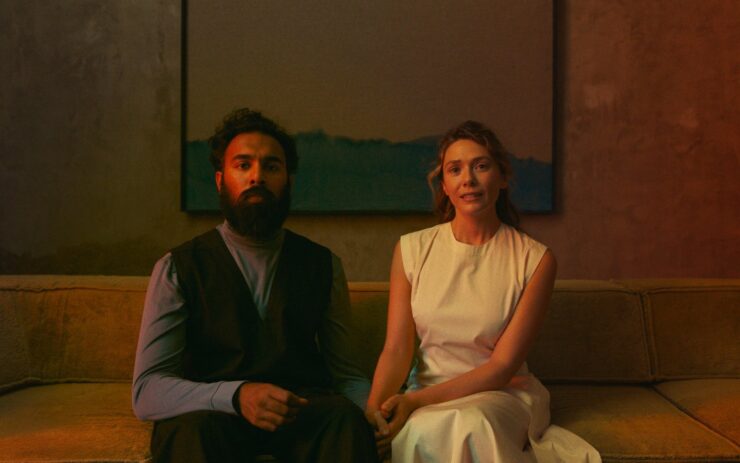
reactormag.com
The Assessment Mocks Us For Trying To Have It All
Movies & TV
The Assessment
The Assessment Mocks Us For Trying To Have It All
A dystopian government assessor puts would-be parents through a surreal childrearing crash course in Fleur Fortuné’s gripping debut.
By Natalie Zutter
|
Published on April 1, 2025
Photo Credit: Magnus Jønck © 2024, courtesy of Magnolia Pictures
Comment
0
Share New
Share
Photo Credit: Magnus Jønck © 2024, courtesy of Magnolia Pictures
One of the most difficult aspects of infertility is holding two versions of yourself in your mind: the you who is able to achieve your dream of having one or more children, and the you who never succeeds and continues forward with your life knowing that a particular door has been shut, a decision made. Director Fleur Fortuné takes this dilemma to the sci-fi extreme in The Assessment, in which dystopian government assessor Virginia (Alicia Vikander) observes married scientists Mia (Elizabeth Olsen) and Aaryan (Himesh Patel) for a week to determine their fitness to be parents.
The Assessment is Ex Machina meets May December: Invited into the couple’s isolated seaside home (protected from radiation by a translucent dome), Virginia performs a rigorous, highly unorthodox series of tests and trials designed to challenge their patience, their sanity, their ability to be calm in a crisis. (That Vikander gets to transition from Turing Test subject in Ex Machina to parenting tester here lends wryness to her dynamic performance.) Without warning, she abruptly adopts the mannerisms of nearly every developmental stage from toddlerhood to adolescence: throwing food and throwing fits, alternating between giggly bouts of childlike awe and heart-stopping moments in which she puts herself in real danger of drowning. She forces them out of their bedroom and work spaces, only to wriggle her way into their bed in the middle of the night. She challenges them to protect her as if she is helpless, to love her as if she is their own. And right when they lose their cool and snap from the overstimulating emotional whiplash, she reverts back to the dispassionate assessor who holds their future in her hands.
But as Virginia shifts between the roles of their hypothetical daughter and her inscrutable self, crossing boundaries and wearing her “mother” Mia’s clothes, it also creates moments of psychosexual double vision. Is this a temporary pretend family unit, or three adults in a strange competitive triangle of attention and power dynamics? This bizarre ritual is not only above-board, but it’s the only way to have a baby in the State, whose citizens dutifully take a combination birth control/longevity medication that keeps them from having children willy-nilly like those unfortunate souls across the border in the Old World; in return, they get to live forever. If and when they do want to propagate—embryos in artificial wombs only!—they must be properly vetted.
By the State’s standards, these two should be ideal candidates: Each enthusiastically contributes to their new society, she’s growing radiation-resistant crops in her detached greenhouse and he’s fine-tuning the tactile textures of virtual pets in his underground VR chamber. Sure, her mother was a dissident exiled to the Old World, and he was caught up in an activist firebombing after the government’s mass extermination of all pets for disease control, but those experiences are footnotes in the introductory questionnaire and (probably) won’t be held against them. Mia is already used to sleepless nights nurturing something tender and vulnerable; Aaryan already possesses the patience required to fill in a simulacrum hair by hair, i.e., to guide incremental growth.
Their contrasting approaches to experiments hint at how well they will respond to the increasingly absurdist assessment: He’s prepared to role-play hypothetical games of hide-and-seek and mentally superimpose a child onto a grown woman, while she struggles to entirely lose herself in make-believe, so fixated on the idea of a real baby, no tricks. Mia’s quandary will resonate with many women who have battled their own ambivalence about the realities and responsibilities of motherhood, while Aaryan’s willingness to go with the flow as the cool dad is all-too-familiar. So too is him castigating Mia for losing her cool with Virginia-as-child, scolding his wife that “you cannot behave like this if you want a child!” Rather than catalog Mia and Aaryan’s present behavioral quirks and optimistic plans for parenthood, Virginia (as a representative of the State) holds them up against an impossible standard.
The film is prone to mouthfuls of exposition in various scenes, but considering that these occur during the most awkward dinner party, such infodumps can be forgiven for being served alongside delicious discomfort. One of Virginia’s unhinged challenges involves an impromptu gathering that Mia must host, including both of their ex-lovers and Aaryan’s mother (Indira Varma, delightfully brittle) and Minnie Driver as a bitter 150-year-old who remembers the time before and sees through all the bullshit. The State’s power to corral all these people, on such short notice, to play along with this farce, makes you wonder what kinds of sacrifices it demands from all of its citizens to keep from repeating old mistakes.
Olsen magnificently embodies the ambivalence of a woman who wants to be a mother but has difficulty role-playing the hypothetical; a daughter so desperate not to replicate her own mother’s failures that she puts a militarized border between them. Despite Mia’s hesitation to fully commit, her and Virginia’s dynamic subtly transforms into the familiar contention between mothers and daughters, only to evolve into something deeper and even more nuanced with a third-act reveal about Virginia’s true motivations. Vikander stunningly plays vulnerability at different “ages,” embodying the blank slate of exploring new experiences as well as the soul-crushing weight of interminable existence. While Patel brings softness and sensitivity to Aaryan’s penchant for hiding out with simulacra, his character is more often reacting to the plot in ways that don’t land as convincingly. The abrupt relationship shift between “Daddy” and “daughter” is not surprising for those who have seen Splice (another sci-fi movie that hinges on a taboo trio), yet the movie plays a scene of very questionable consent more as dark satire than outright violation.
Rather than determine if an artificial intelligence can fool a human, this extended test assesses whether two brilliant, creative, hardworking, loving citizens are capable of exploding their lives in order to make room for a new member of their family. That is, are they willing and able to watch their hard-won inner world get destroyed, after the larger world has already ended and begun again? The Assessment isn’t just about judging strangers’ fitness as potential caretakers of the next generation. It asks who we can entrust with our future, when we so mishandled the past. Mia is more equipped for physical survival, but Aaryan is more adaptable to creating virtual comforts for people to accept in place of the real thing. One of these strengths better benefits the family, while the other better serves the State.
One of the couple’s most absurd trials is erecting a massive IKEA-style geodesic dome playroom-slash-shelter for their hypothetical kiddo before dawn, besieged by a ludicrous number of bolts and almost undone by the last-minute discovery of a missing piece that Mia promptly hurls into the ocean. It’s a clever metaphor for the much-wanted child: Is it the vital missing piece, or can things operate well enough without it? The Assessment holds space for both interpretations, a Schrödinger’s family unit in a world that may not survive its own rebirth.[end-mark]
The post <i>The Assessment</i> Mocks Us For Trying To Have It All appeared first on Reactor.














